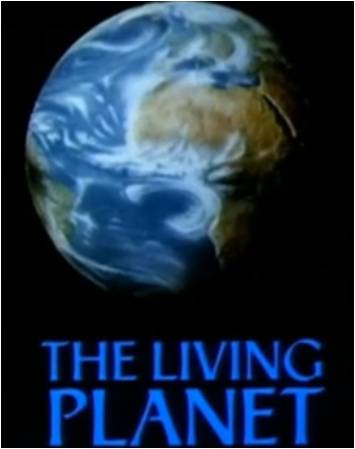The Living Planet: A Portrait of the Earth
The Living Planet: A Portrait of the Earth is a BBC nature documentary series written and presented by David Attenborough, looking at the ways in which living organisms, including humans, adapt to their surroundings. The series consists of twelve episodes which explain how the Earth works and how living organisms survive and thrive in different environments.

In the opening of the series, David Attenborough narrates: "Our planet, the Earth, is, as far as we know, unique in the universe. It contains life. Even in its most barren stretches, there are animals." As the narration hints, he explores every corner of the planet. First, he goes to the world's deepest valley in the Himalayas where temperatures range from those of the tropics in its lower reaches to that of the poles higher up. This is an example to show how creatures become adapted to living in certain environments. And he explains how the Earth has become formed as today as well as examines the life around volcanic eruptions. Then he explores the polar regions, the northern coniferous forests, the jungles of the tropics, the savannahs of Africa, North America and South America, and the world of deserts. And then he looks at the creatures that spend most of their lives in the air, freshwater habitats and their inhabitants, coastal environments and the effects of tides, remote islands and their inhabitants, and the marine environment. Lastly, he tells of "New Worlds" that humans have changed so far not only by creating new ones like villages and cities but also by destroying environments like deforestations and oil spills.
Episode 01 - The Building of the Earth
This explains how the Earth has become formed as today as well as examines the life around volcanic eruptions.
Episode 02 - The Frozen World
This episode describes the inhospitable habitats of snow and ice. Mount Rainier in America is an example of such a place.
Episode 03 - The Northern Forests
This episode examines the northern coniferous forests. The programme begins in northern Norway, 500 kilometres north of the Arctic Circle.
Episode 04 - Jungle
This episode is devoted to the jungles of the tropics. Attenborough ascends a kapok in the South American tropical rainforest to observe "the greatest proliferation of life that you can find anywhere on Earth."
Episode 05 - Seas of Grass
This episode looks at a plant of which there are some 10,000 species and which covers over a quarter of vegetated land: the grasses.
Episode 06 - The Baking Deserts
This episode explores the world of deserts. It begins in the largest, the Sahara, where the highest land temperatures have been recorded.
Episode 07 - The Sky Above
This episode deals with the air and those creatures that spend most of their lives in it.
Episode 08 - Sweet Fresh Water
This episode focuses on freshwater habitats. Only 3% of the world's water is fresh, and Attenborough describes the course the Amazon, starting high up in the Andes of Peru.
Episode 09 - The Margins of the Land
This episode details coastal environments and the effect of tides, of which the highest can be found in the Bay of Fundy in North America.
Episode 10 - Worlds Apart
This episode investigates remote islands and their inhabitants. Some islands are tips of volcanoes; others are coral atolls.
Episode 11 - The Open Ocean
This episode concentrates on the marine environment. Attenborough goes underwater himself to observe the ocean's life forms and comment on them at first hand.
Episode 12 - New Worlds
This episode surveys those environments that have been created by and for humans.
| Related Links |
| The Living Planet - wikipedia The Living Planet: A Portrait of the Earth is a BBC nature documentary series written and presented by David Attenborough, first transmitted in the UK from 19 January 1984. |
| Planet Earth This is a BBC nature documentary series narrated by David Attenborough, looking at a global overview of different habitats on Earth. |
| Life on Earth This is a BBC nature documentary series about a study of the evolution of life on the planet. |
| Nature's Microworlds This is a BBC documentary series narrated by Steve Backshall, looking at some of the world's most iconic ecosystems. |
| Human Planet This is a BBC documentary series narrated by John Hurt, describing the human species and its relationship with nature in the world today. |